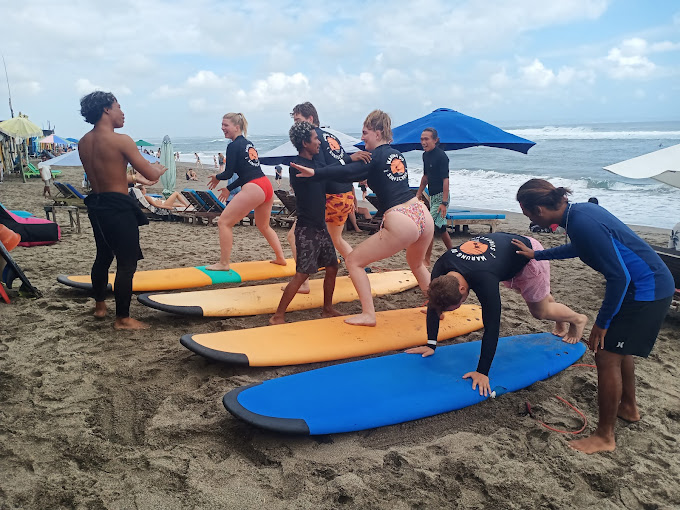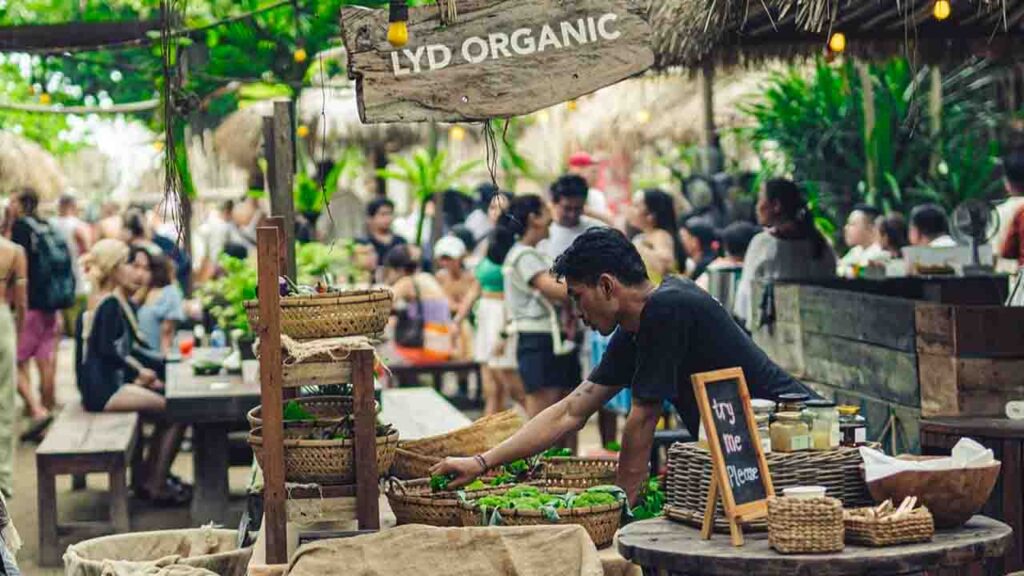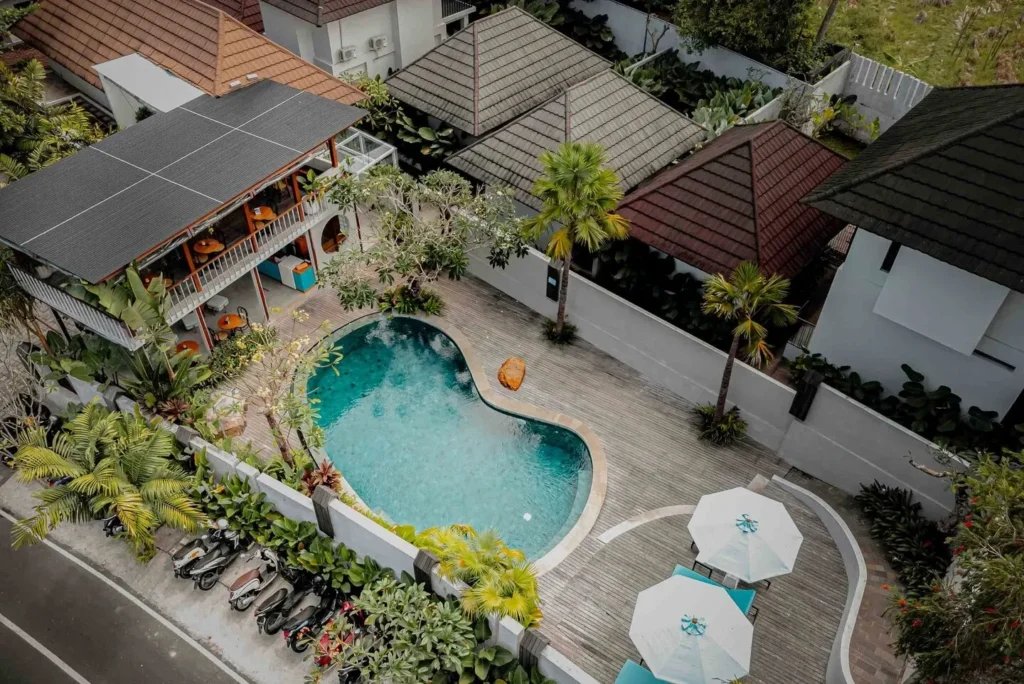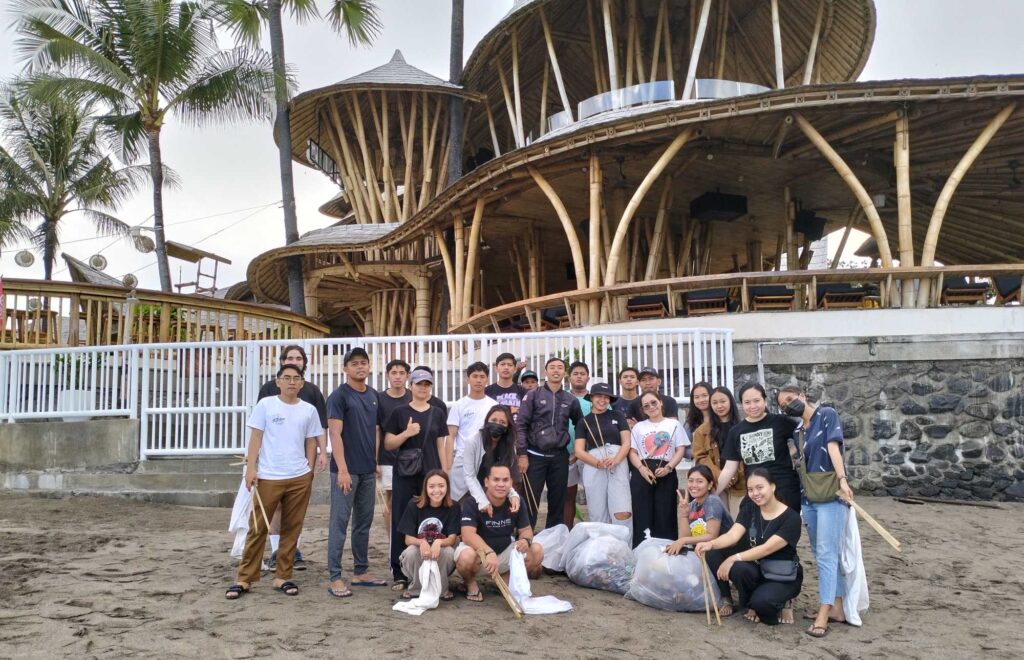Canggu is a laid-back gem on the coastline of Bali’s south coast. It’s changed dramatically in just a few years from a quiet surfing village to a major hub for travellers that seek the sun, sand and charm of this paradise island.
Beyond the trendy cafes and world-class waves, this part of Bali is carving out a new reputation, one focused on a greener future. It’s the island’s top hotspot for sustainable tourism.
Canggu offers a wealth of eco-friendly activities where you can enjoy Bali’s natural beauty while keeping the planet in mind. From farm-to-table dining initiatives, to eco-conscious resorts, to community-driven responsible tourism practices, let’s take a deep dive into what Canggu can do to help you blend adventure, fun, excitement, relaxation and sustainability into the ultimate holiday.
Surfing With A Purpose Beyond Catching Waves
If there’s one thing about Canggu, it’s that it’s a legendary surfing destination, and while the area has been developing into more than a surf village, the surf culture here continues to thrive; it’s the cultural heritage of the area.
With Batu Bolong, Berawa and Echo Beaches offering black sands and consistent waves, Canggu has become a true haven for surfers at any level of experience. You can learn to surf here, or you can polish your skills before you tackle the pro-level breaks of Uluwatu.
There are many surf schools, but some of them have started to invest their energies into conservation efforts and schools like Kima Surf and Mojo Surf now prioritise the ecological wellbeing of the waves that they surf.
You’ll find that their lessons go beyond the basics of mastering the board and delve into the efforts needed to protect the island’s coastlines for future generations. After all, don’t you want your grandchildren to be able to experience Bali’s natural beauty too?
These eco-friendly initiatives are all part of the service at these surf schools.

You can also find eco-conscious board rentals at Kayu Surfboards, which crafts its boards from reclaimed wood and other forms of renewable wood. Renting a board from these sources helps reduce the carbon footprint of your holiday and assists with water conservation, too. And it’s no more expensive than renting a board from anyone else.
If you want an eco-friendly surfer hotel, then check out Atap Resort, it’s a solar-powered retreat a stone’s throw from the sand at Echo Beach. That means you can walk or cycle to the beach and further reduce your environmental impact by not creating a bigger carbon footprint in travel.
The resort’s commitment to sustainable tourism is self-evident when you arrive as they have bamboo architecture and plastic free initiatives advertised everywhere.
Pro Tip: You can check out beach clean-ups, which are often organised by surf schools and other local community groups (like the one organised by FINNS Beach Club, which also uses a robot now – BeBot – to keep the shores of Canggu sparkly clean). Joining an activity like this helps to give back to the area and ensure we can all experience Bali’s natural beauty as it’s meant to be.
Sustainable Shopping From Local Farmers And Local Communities
The two main shopping streets, Jalan Pantai Berawa and Jalan Pantai Batu Bolong, are great places to find local artisans plying their wares in boutique stores. Places like The Jungle Trader and The Slow Concept Store are full of slow-fashion clothing, tropically-inspired home decor and other crafts.
Shops like these emphasise the use of sustainable materials like organic cotton, bamboo, reclaimed wood, etc. which supports the local economy while reducing waste, minimise the environmental impact and helps to encourage guests to the island to support conservation efforts with their shopping.
If you’re into market shopping, then the Samadi Market, which is held every Sunday, is a great wellness-focused spot that offers organic produce, vegan treats, natural soaps, handmade jewellery and the like from local artisans and local farmers. You will want to get there early if you want to get the best of the local community products and freshest goods.

La Brisa Sunday Market is also a great place for local artisan-made clothing, homewares and beauty products. The prices might be a little higher here than in your typical souvenir store, but the high-quality and ethical backing make things good value for money all the same.
One Love is a local second-hand store which helps with reducing waste by ensuring that pre-loved garments make their way back to new appreciative owners. They have everything from jeans to bikinis, and this kind of circular fashion is all too welcome on the island.
You might also check out Luna & Rose if you like sustainable jewellery, as they make pieces from recycled silver and donate some of their profits to eco-friendly initiatives on the island.
Ibu Bumi is our favourite sustainable cosmetics brand on the island and they’re very near to FINNS Beach Club.
Pro-Tip: It’s best to take a reusable tote bag to the markets to avoid the use of plastic bags (which have a terrible environmental impact). You should also keep an eye on Instagram to watch out for pop-up events in the local community, which also help with energy conservation and reducing waste while showcasing the work of local artisans.
Farm-To-Table Dining Experiences: Supporting Local Artisans
Canggu’s food scene is one of the best in Southeast Asia, and many restaurants have adopted responsible tourism practices such as sourcing from local farmers and local communities. Eco-conscious dining is very popular in the area.

One area that the food scene here particularly excels at is plant-based dining and places like Bali Buda (which offers delicious vegan Buddha bowls, homemade peanut butter, almond milk and organic produce galore) and Ekosistem’s Sari Kitchen and Community which is heavily into conservation efforts, even use recyclable packaging which customers are encouraged to bring back and use again and again.
Then, there’s Cantina, which is a full farm-to-table Italian restaurant. They partner with local organic farms to ensure fresh, seasonal ingredients that are all about energy conservation, water conservation and minimal waste. Even the portion sizes are carefully considered to ensure that almost nothing goes to waste.
Nalu Bowls is another great example of a restaurant sourcing from local communities and delivering nutrient-packed meals that are truly eco-conscious.
We are also big fans of Jiwa Cafe which is super cute and in a lovely community garden area which focuses on farm to table including eggs and veggies from their own garden.
Pro-Tip: Many of the cafes in Canggu offer a discount if you’re carrying your own reusable cups or containers. So, why not pack a tumbler before you go for your morning coffee?
Yoga And Wellness Retreats With An Eco-Twist
Where Ubud may once have had the claim to be the finest yoga destination in Bali, Canggu’s been sneaking up in the last few years, and it won’t come as a surprise to find that some of the most eco-conscious yoga studios are in the area.

Check out The Practice or Samadi, both of which offer classes that blend mindful awareness with sustainability.
The Practice delivers sessions (from Hatha to Yin styles) in open-air spaces that are built using sustainable practices from bamboo and reclaimed wood. They offer sound healing, holistic treatments, and so much more, and it’s all meant to bring about an appreciation for Bali’s natural beauty and thus a concerted effort to engage with sustainable tourism to protect the island for future generations.
Serenity Eco Guesthouse will help you take your eco-conscious pursuit of yoga and wellness to the next level with daily yoga classes, plant-based dining, workshops on sustainable living and more. The design of the place is all about minimalism and emphasises natural ventilation to promote energy conservation. The lush gardens that they offer their guests also help to promote local biodiversity.
There’s also KoR Pilates in town, which offers an eco-conscious studio for pilates connoisseurs.
Pro-Tip: Many of the yoga and wellness spots in town offer free trial classes through systems like ClassPass, so you can try them before you commit to a long course.
Eco-Friendly Resorts And Villas
Of course, when FINNS Bali Resort opens, there will be an emphasis on sustainable practices there, but for now, the area has plenty of eco-conscious accommodation options that don’t skimp on the luxurious touches that you need.
Masmara Resort is one example. This Pererenan-based resort is a real standout with sustainable architecture, using natural stone, bamboo and reclaimed wood. It incorporates solar energy, reusable water bottles are provided to all guests, and there’s a zero-plastic theme throughout.
They even have a farm-to-table dining experience in their restaurant, which is a great spot for foodies.

Then check out Ecozy Dijiwa Canggu, which blends attractive modern aesthetics with its eco-friendly design. It’s very close to Batu Bolong and Echo Beaches for surfers looking for a sustainable stay. They are all about energy conservation and have a zero plastic policy too.
If you’re looking for a luxury villa, the Ametis Villa Bali has some great eco-touches like reusable bags and locally made hand-woven slippers from Flores. They also have a strong commitment to corporate social responsibility and partner with local social enterprises to promote their activities.
Pro-Tip: You’ll want to book early to make sure you get a place at these sustainable tourism resorts, they’re super popular with the green travel community. Make sure to enquire about a resort’s green efforts to ensure they align with your values and priorities when you book.
Sustainable Practices: Bali’s Beach Clean Ups And Community Initiatives

The community in Canggu is very passionate about keeping the town’s beaches pristine, and if you want to give back to the community, a beach clean-up is a great way to do it.
Many of the local surf schools organise clean-up drives, and FINNS Beach Club leads regular clean-up events on Berawa Beach.
These activities are usually completely free to join, and they give you a chance not just to collect some rubbish from the sand but to connect with local culture, local people and other travellers.
FINNS has recently commissioned its BeBot robot to deep clean the sand on Berawa Beach to a level that human teams can’t reach. It works in tandem with their regular beach cleaning team to get the best results.
You might also enjoy taking some time out of your day to give some homeless cats some love. While adopting a pet in Bali is not something to be taken lightly, as you can’t take an animal off the island under any circumstances, there are some excellent community-run cat cafes that you can visit.
Our favourites include Omah Neko Cat Cafe and The Odd Cat Bali. Go and enjoy a locally made cup of coffee and appreciate the cuteness of it all.
Pro-Tip: Make sure to follow eco-friendly groups on social media to learn about upcoming events. When you attend, bring some gloves and a reusable water bottle to ensure you’re comfortable throughout the clean-up.
Exploring Bali’s Natural Beauty With A Sustainable Spin

The beauty of Canggu goes a long way beyond its beaches. Why not head out to Pererenan, rent a bicycle and cycle through the rice fields? It’s the ultimate low-impact tour of the Balinese countryside.
There’s a lovely walk from FINNS Beach Club to Pererenan which you can do for free at sunset time.
You could also consider joining a sustainable tourism tour of the nearby waterfalls. These include eco-friendly transport, local guides, and encourage environmental preservation.
You might even enjoy hiking at Mount Batur, which is a fairly long drive from Canggu. There are several sustainable tourism operators who can help you hike this incredible volcano with eco-conscious behaviour at the top of the list.
Pro-Tip: Take a waterproof phone case and a dry bag, particularly if you’re going near a waterfall.
Creative Workshops In Canggu With A Sustainable Spin
You could also enjoy some work with local artisans. For example, the Nusa Clay Club lets you make your own ceramic products with locally sourced clay. It’s all about low impact and minimal waste. So, you can have your own eco-conscious souvenir.
Or head to Wild Art in Pererenan, where they will let you use non-toxic water-based paints to create stunning art on a canvas using water guns and balloons! It’s great fun.
Pro-tip: If you opt for a ceramics workshop, always go early in your time here, it takes time to fire a piece, and you may not be able to pick it up if you leave it too late. If you visit Wild Art, make sure to take your own smock.
FAQs
What Are The Sustainable Tourism Practices In Bali?
There is a sometimes-effective ban on single-use plastics, and most businesses and people have stopped using plastic bags and plastic straws. Many businesses pay fair wages and meet their tax obligations. Others use organic produce. Many resorts have stopped using small plastic bottles for their hygiene products.
Some businesses like FINNS have taken their waste minimisation strategies to the next level, fully sorting, separating and recycling wherever possible. This waste reduction ensures that only 5% of the waste generated by visitors goes to the landfill.
Is Canggu Rural?
Yes, while Canggu is developing pretty quickly, it’s still considered to be a rural landscape, and you can still find rice farms and the like in the area.
Is Canggu Very Touristy?
Canggu is very popular with tourists, but it never feels like it’s being overwhelmed by tourists. There’s plenty of Canggu to go around, and visitors tend to space themselves naturally over the area.
What Are Sustainable Activities?
There are many sustainable activities that can take place, from reducing waste and preventing pollution, to conserving water resources, to promoting and preserving biodiversity, to encouraging environmental awareness, to enjoying sustainable dining, etc.
What’s The Most Sustainable City In Indonesia?
Semarang City in Central Java was recently voted the most sustainable city in Indonesia. It’s been making huge inroads in water conservation and is thus reducing its environmental impact substantially.
Final Thoughts On Sustainable Tourism And Local Culture In Canggu
Canggu has it all. Sun, sea, surf, wellness, and eco-conscious vibes that go far beyond the cosmetic. It’s a dream destination for those who want to travel without harming the planet.
You can catch the waves on Berawa Beach, shop for sustainable treasure at Samadi Market, chill at an eco-resort, and everything you do can be a responsible, eco-friendly activity.
When you support local artisans, join clean-up efforts, and choose an ecologically sound hotel, you’re not just visiting; you’re preserving Canggu for the next group of adventurers to arrive here.
Pack your reusable water bottle, rent a bike and dive into the sustainable side of Canggu. With every sustainable choice you make, you actively contribute to making a positive impact on this little slice of paradise.






